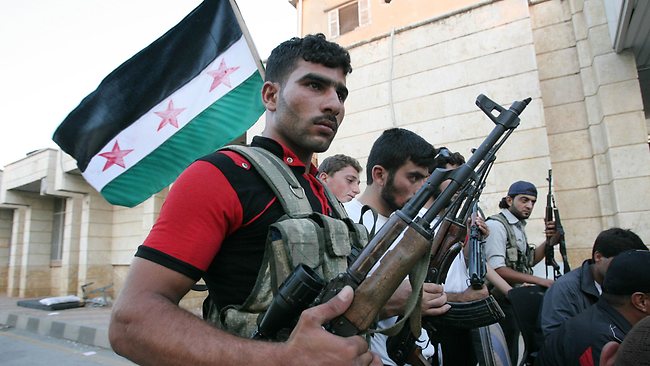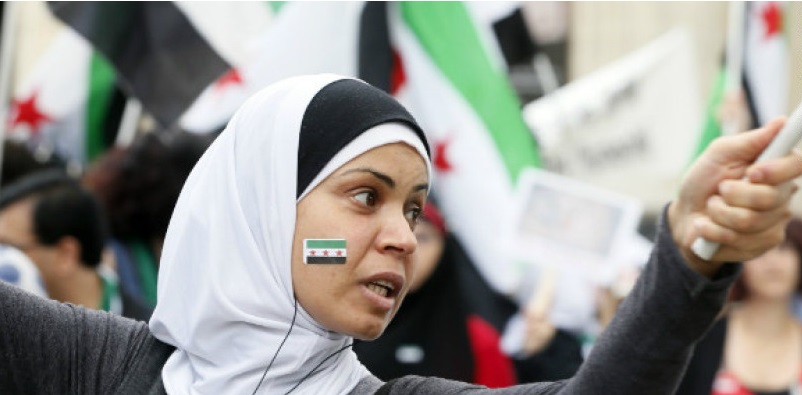In March 2011, Syrians, both women and men, marched together against the Assad regime. Almost three years on and the Geneva II conference is currently underway; talks that intend to bring Syria together in peace and set up a transitional government. What’s the difference? This time there’s hardly a woman in sight.
To begin, it seems important to note that the Geneva II peace talks are not expected to strike a ‘deal’ or create an immediate solution for the Syrian Conflict, rather begin a process of moving forward to provide the people of Syria with the best outcome that can be achieved. Though it has been stated that there does seem to be some progress (updated), many have rightly argued that true peace can never be established without steady civil society, and without women at the table, it seems that such issues are being ignored.
Though the movement for women’s involvement in the Geneva peace talks were pushed by UN Women , Women’s International League for Peace and Freedom, Women’s Democracy Network, Karama, CodePink and many more groups, it came to no avail. Instead, men with ties sit around a table, discussing how to make the men with guns put down their weapons and shake hands. Of course, if the entire country of Syria consisted only of men, this would make complete sense. It would also make sense to have entirely men at the table if it were only men who were being affected by the brutal civil war…
Women and children make up 80%+ of Syria’s displaced peoples.
Women and girls are most definitely affected by the civil war.
When looking back to the 2011 protests, women marched alongside men in the hope of a new Syria – a Syria of progress and peace. The scene over the past few years, with the Syrian Observatory for Human Rights counting the death toll as over 130,000 since March 2011, has seen our newspapers and television screens full of pictures such as this:

And more recently, a whole lot of this:

In an open letter, Women Living Under Muslim Laws (WLUML) stated:
“Those with political and military power – despite the atrocities committed by them and in their name – have been given a place at the table unquestioned. The women who toil daily – holding communities together and struggling for peace – have to battle to have their voices heard.”
An extremely poignant point. And Rim Turkmani, chair of the Syrian NGO Madani, argues that now, during Geneva II, is the best possible time for Syrian women to share their views and have this voice they battle so hard for:
“If we look at most Syrian women’s voices… most of them were heard in the first eight months when it was peaceful. They had a leading voice. When it became violent they became victims. Now they are resurfacing and calling for peace.”
Furthermore, the battle to have their voices heard is not once of principle or, specifically, equality. Moreover, it is because the women of Syria have important views and ideas to put forward in the Geneva peace talks that could significantly influence, and improve, their country’s future. On Jan 6th, over sixty Syrian women gathered, at much risk to themselves, in Damascus and issued the Syrian Women’s Charter ‘outlining their shared vision for Syrian women, for the future Syrian state, and for peace.’ Integrity Research and Consultancy’s report from earlier this month, states that the presence of women at Geneva II would ‘change the focus of negotiations from power-sharing to peace-building.’ Last Tuesday (Jan 21st), women activists from around the world gathered at the Geneva Graduate Institute and during these talks the key sentiment seemed to be that peace cannot be achieved in Syria without civil society and that whilst “not all women are a voice for peace…Women are a power for peace” especially “women working from a civil society perspective.” (Rim Turkmani)
It is not by waving a gun, or flashing a tie, that true peace will come to Syria, but the coming together of ideas from the people, men and women, in pursuit of a country that meets the needs of all. Without women at the table, true peace can surely never be achieved, and it seems hard to believe that the Geneva II peace talks are actually “peace” talks at all.

